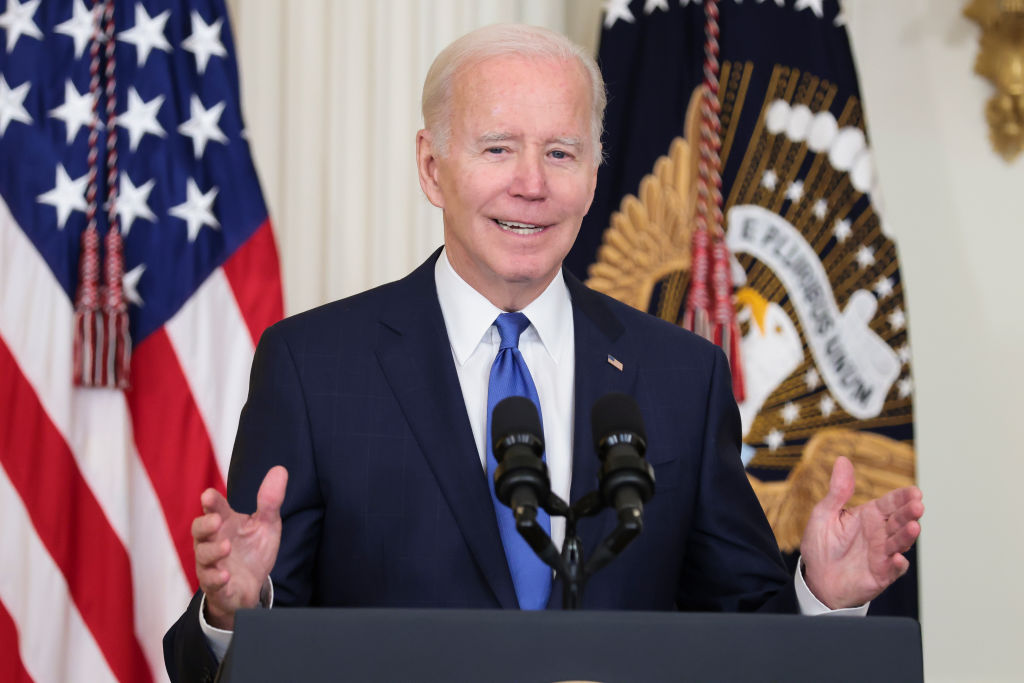Monsters of Rock: Westpac says US EV supply chain protectionism could delay energy transition

Pic: Oliver Contreras/Getty Images
Could the US’s green EV dream actually play into China’s hands?
Last year’s Inflation Reduction Act has seen a flood of investment flow into battery metals explorers and developers, with ASX lithium companies increasingly pivoting to places like Canada in the hope of taking part in a burgeoning US-led supply chain for battery materials.
The aim is to revive the US’ historic auto industry by providing incentives to companies who produce electric vehicles onshore with materials that are sourced from the United States or countries like Australia with whom the States holds free trade agreements.
To be eligible for the tax breaks the OEM must source 40% of their materials from these jurisdictions, rising to 80% by 2026.
But Westpac IQ Head of International Economics Elliot Clarke warned, in a video note today, the plan could backfire, with the US’ protectionist policies providing an advantage to the well established Chinese EV and renewables supply chains.
“Why is this policy decision or concern for the Global Green transition? Because China who certainly does not have a free trade agreement with the US is essential to the global supply of electric vehicles and componentry as well as many other goods critical to the green transition,” he said.
“To give a sense of China’s importance in global supply BloombergNEF estimate that China represents over 70% of battery cell production, lithium refining and wind turbine cells.
“More significant still, China is also currently producing over 95% of the global supply of solar wafers and ingots.
“Given the pivot China is making into Asian markets and the need the region has for green energy and transport, any Chinese produced products that the US does not want could instead be marketed to Asia, not to mention other developed and developing nations.
“The US decision to impose protectionist measures on production related to the green transition is therefore principally a threat to its own emissions reduction goals, not China’s strength.”
Clarke says restrictions against China could also delay the transition by making it more costly in the developed world.
“Competition and inefficiency in sourcing of commodities, labour and freight would add further uncertainty to costs and supply to end users,” he said. “The financial bill to the world could become substantial but it is the time delays in adoption and emissions reduction and the adverse impact on the environment that will prove most costly.”
Food for thought. Australian companies are still playing in Asian markets, including in downstream processing. Mineral Resources (ASX:MIN) signed off last week on a near $1 billion investment with US-listed Albemarle no less to take a 50,000tpa half share in new lithium hydroxide processing capacity in China.
It is expected the new plants will be much faster to market than Australian processing plants like those built by Tianqi and IGO and Albemarle in WA, which have seen labour shortages and major commissioning and construction delays.
Aussie miners extend gains
Mining stocks remain the big winners today after strong PMI numbers out of China, via both the official and Caixin PMIs demonstrated its economy was rebounding post-Covid and Lunar New Year.
That put a rocket under metal prices and the Aussie firms who peddle those metals, largely to the Chinese market.
South32 (ASX:S32) was up 5.15%, with Mineral Resources (ASX:MIN), Fortescue Metals Group (ASX:FMG), Whitehaven Coal (ASX:WHC), Rio Tinto (ASX:RIO) and BHP (ASX:BHP) all up around 4% or more.
Materials stocks closed the day up 2.89%, with energy stocks up 1.44% against an ASX 200 gain of just 0.05%.
Monstars share price today:
Related Topics
UNLOCK INSIGHTS
Discover the untold stories of emerging ASX stocks.
Daily news and expert analysis, it's free to subscribe.
By proceeding, you confirm you understand that we handle personal information in accordance with our Privacy Policy.








